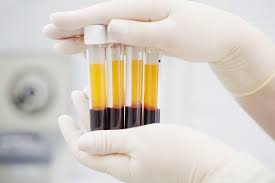John Hopkins Medical Professionals Publish Open Clinical Guide For COVID-19 Blood Plasma Therapy
Source: COVID-19 Blood Plasma Therapy Apr 14, 2020 5 years, 1 week, 5 days, 5 hours, 46 minutes ago
COVID-19 Blood Plasma Therapy: Medical experts from Johns Hopkins have created a clinical guide to help hospitals and medical centers rapidly scale up their ability to deliver so-called convalescent plasma therapy, which leverages immune system components found in the plasma portion of blood from people who have recovered from COVID-19 illness.

Dr Evan M Bloch, M.D., M.S. an Associate Professor of Pathology at the Johns Hopkins University School of Medicine who is part of the team working on convalescent therapy told Thailand Medical News, "We've received many inquiries from health care providers looking to ramp up their ability to deliver this therapy. There is historical precedent for its use to prevent and treat viral illness. However, during the chaos of an epidemic, the therapy is often deployed without rigorously studying its effects. Carefully conducted studies are critically needed to understand which people are most likely to benefit from this therapy and how best to apply it to optimize that benefit."
The clinical guide was published in the
Journal of Clinical Investigation.
https://www.jci.org/articles/view/138745
Infectious disease expert Dr Arturo Casadevall, M.D., Ph.D., in recent weeks has led a team of doctors and scientists from around the United States to establish a network of hospitals and blood banks that can begin collecting, isolating and processing blood plasma from COVID-19 survivors.
Dr Casadevall, a Bloomberg Distinguished Professor who holds joint appointments in the Johns Hopkins Bloomberg School of Public Health and the Johns Hopkins University School of Medicine added, "This paper details the nuts and bolts of how to deploy convalescent plasma, and this information should be very helpful to colleagues worldwide who are preparing to use this therapy against COVID-19."
The US FDA has paved the way for researchers at Johns Hopkins to proceed with clinical trials to test convalescent plasma therapy in people who are at high risk for severe COVID-19 illness and have been exposed to people who have tested positive for the virus. Like most therapies, Dr Bloch says, convalescent blood plasma's best potential for effectiveness is early in the disease's progression.
Currently, there are no proven drug therapies or effective vaccines for treating COVID-19 although a few new drug candidates have emerged in recent weeks including ivermectin but more research and clinical trials is needed to fully understand its efficacy.
The clinical guide outlines a range of clinical trials underway or planned at hospitals taking part in the Johns Hopkins-led network for convalescent plasma therapy.
Some of the protocols outlined in the guide include criteria for eligible donors of blood plasma, how hospitals can mobilize donors and work with local and national blood centers, methods for prescreening donors, and the risks and potential benefits of the therapy.
Dr Bloch, also an expert on global health, says convalescent blood plasma therapy can be deployed in low-resource communities. There is a difference, however, in how blood plasma
may be collected in communities with low versus high resources.
He added that high-resource communities typically rely on apheresis machines to remove a donor's blood, filter the plasma from it, and return the rest of the blood, plus a replacement for the collected plasma (i.e. a protein called albumin), back to the donor. Using the apheresis method, a single donor could produce enough plasma to potentially benefit up to three other people.
However in low-resource communities where apheresis machines may be unavailable, the output of plasma would be less per donor. This is because doctors have to perform a typical whole blood donation from the donor and manually separate the plasma in a laboratory by using a centrifuge machine or letting gravity separate the blood products.
Dr Bloch added that among the most common challenges to scaling up convalescent blood plasma therapy, is rapidly developing in-house testing for whether the blood plasma of donors contains key antibodies the immune system needs to recognize and help destroy the virus in the body. There are also logistical challenges associated with identifying donors and performing repeat COVID-19 nasal swab tests for the virus in them.
Dr Bloch added, "This field is moving so fast that a problem today is solved tomorrow. We aimed to publish a baseline document that can serve hospitals globally. It will, undoubtedly, evolve."
For more developments on
COVID-19 Blood Plasma Therapy, keep logging on to
Thailand Medical News
KINDLY HELP! Please help support our site and our initiatives to propel and aid research by making a donation to help sustain the site. Donations are accepted via paypal: https://www.thailandmedical.news/p/sponsorship
